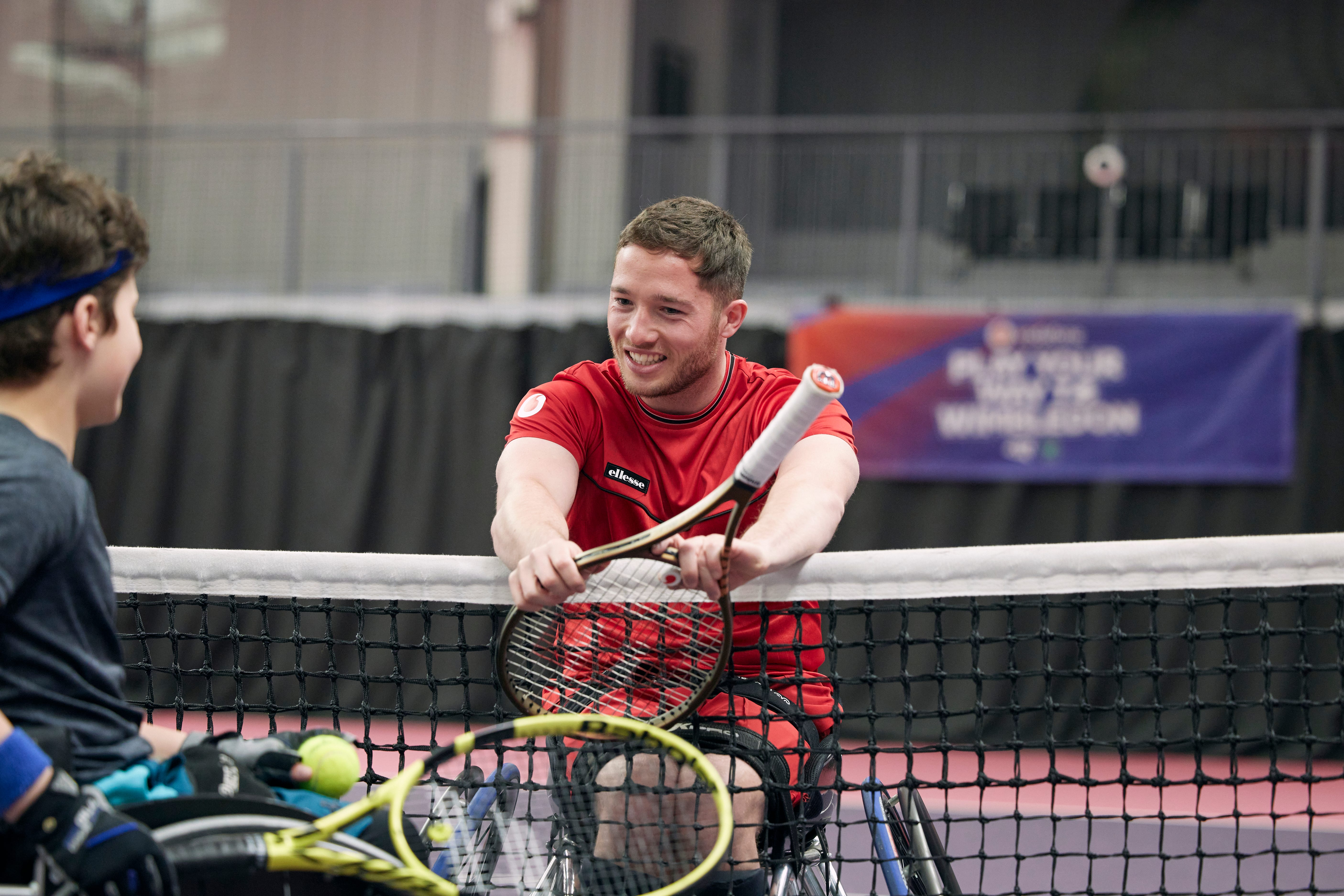Alfie Hewett excited to keep inspiring disabled people to take up tennis
Hewett is encouraged to see an increase in opportunities for wheelchair competitors.

Your support helps us to tell the story
From reproductive rights to climate change to Big Tech, The Independent is on the ground when the story is developing. Whether it's investigating the financials of Elon Musk's pro-Trump PAC or producing our latest documentary, 'The A Word', which shines a light on the American women fighting for reproductive rights, we know how important it is to parse out the facts from the messaging.
At such a critical moment in US history, we need reporters on the ground. Your donation allows us to keep sending journalists to speak to both sides of the story.
The Independent is trusted by Americans across the entire political spectrum. And unlike many other quality news outlets, we choose not to lock Americans out of our reporting and analysis with paywalls. We believe quality journalism should be available to everyone, paid for by those who can afford it.
Your support makes all the difference.Alfie Hewett is relishing using his status as the best wheelchair tennis player in the world to inspire more disabled people to take up the sport.
The 25-year-old from Norfolk has taken over top spot in the rankings following the retirement of Japanese great Shingo Kunieda and increased his tally of grand slam titles to 23 by winning the singles and doubles crowns at the Australian Open in January.
Hewett will be targeting a first Wimbledon singles title this summer, and earlier this month he was at Loughborough for the first round of the Play Your Way to Wimbledon, powered by Vodafone, competition, which offers grassroots players the chance to play at the All England Club and this year features visual impairment, learning disability and wheelchair categories.
The Lawn Tennis Association has made opening up tennis to everyone its core aim and Hewett is excited to see the growth in opportunities for disabled players.
He told the PA news agency: “I was speaking to some of the youngsters and (the chance to play at Wimbledon) is why they’re here. That sort of incentive is going to keep them playing and bring more people into the sport, which is why I’m so impressed.
“To see so many fresh faces, it’s a massive thing for me. It’s what I want to try to do with my platform – I want to see more people with disabilities being given that opportunity.”
Hewett experienced up close last summer what a powerful message he can send with his achievements on the court.
“There was a local young girl who had leg cancer,” he said. “I spoke to her and her mum about three or four months before Wimbledon.
“She was trying to play on her feet but she was really struggling, she was in a lot of pain, but she didn’t want to play in a wheelchair because she was scared of the perception.
“I gave her two tickets to come to Wimbledon and it completely changed her outlook on what a wheelchair was because it was normal – there were crowds full of people watching, chanting, supporting.
“Now she’s part of the National Age Group Programme, she’s playing twice a week in a wheelchair. I speak to her and her mum nearly every other week.
“That was a big realisation for me personally to see the effect I can have on someone. I know there’s a few others as well. That’s what we can do and if I can help promote that and push that and change someone’s perception or give them that nudge, it’s a rewarding feeling.”
There's no reason why on a Sunday at Wimbledon, we should be stuck on Court 17.
There are wheelchair events at all four grand slams and they have increased in profile in recent years.
The US Open and Australian Open both doubled the size of their wheelchair draws in their most recent editions, opening up the event to more players.
Wimbledon is expected to stick with only eight players in the men’s and women’s singles for 2023 but matches will be played over five days rather than four and finals will again be played on Court One.
Hewett, who reached his first Wimbledon singles final last year and lost a thriller to Kunieda, had previously called for better promotion of the events.
“Of course I love to play on these big stadium courts – for myself, selfishly, it’s an incredible feeling,” he said.
“My memory of Court One last year is one of the best days of my life and what that gave to my friends and family is incredible. But I also know it encouraged youngsters in wheelchairs to pick up a racket and give the sport a go.
“If it’s possible to do that, we should make it happen. There’s no reason why on a Sunday at Wimbledon, we should be stuck on Court 17. Why not get more people watching, being on TV, people speaking about it? I don’t see what harm it can do.”
Hewett is hopeful Wimbledon will soon increase their draws to match the other slams, saying: “I have a good relationship with Wimbledon. I know it doesn’t come from a place that they just don’t want to do it. But having that reassurance that they’re not ignoring us is important.
“It would be great for more wheelchair players to get a feeling for what it’s like playing at Wimbledon, and more British players would be playing.
“I think wheelchair tennis is at the best level it’s ever been at and there’s only positives that can happen from increasing draw sizes.”
:: Play Your Way to Wimbledon, Powered by Vodafone, is the UK’s largest grassroots tennis competition and is delivered in partnership with the LTA, the All England Lawn Tennis & Croquet Club and Vodafone.